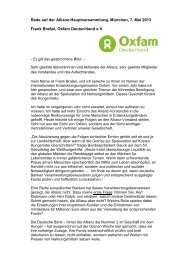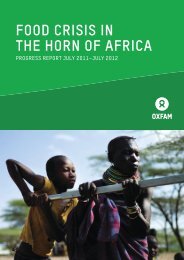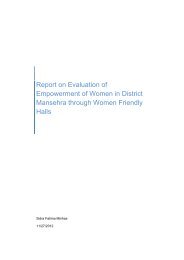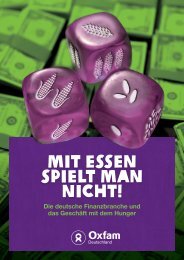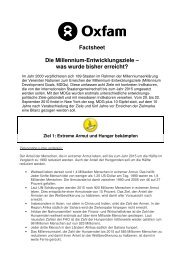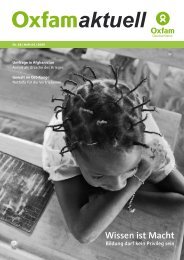shape - Oxfam
shape - Oxfam
shape - Oxfam
You also want an ePaper? Increase the reach of your titles
YUMPU automatically turns print PDFs into web optimized ePapers that Google loves.
PROJECT ACTIVITIES<br />
1. Transforming toxic<br />
masculinities – gender<br />
training for male students.<br />
The masculinities workshops aim<br />
to improve male students’ attitudes<br />
towards gender equality and to<br />
encourage them to support<br />
women’s empowerment. By<br />
training male students, SHAPE<br />
hopes to cultivate a new breed of<br />
men who are non-violent, respect<br />
women, challenge gender role<br />
stereotypes, influence culture<br />
and are tolerant of others.<br />
UBA is an acronym that stands<br />
for University Bachelors<br />
Association and is commonly<br />
used to refer to male students<br />
at MSU. One workshop<br />
participant described the key<br />
traits of an “ordinary UBA” as:<br />
• not considering other<br />
people’s feelings;<br />
• rudeness and obscenity;<br />
• having multiple sexual partners;<br />
• forcing oneself on a<br />
woman; and<br />
• the excessive consumption<br />
of alcohol.<br />
These negative behaviours, or<br />
“toxic masculinities” as SHAPE<br />
calls them, are the focus of the<br />
workshops. During the training,<br />
male students explore the issues<br />
of power, violence and society<br />
and how their behaviour places<br />
them at risk of HIV infection and<br />
contributes to sexual harassment.<br />
Rather than listening to lectures,<br />
the young men take part in<br />
interactive exercises which show<br />
them how they learn these<br />
socially-constructed gender roles<br />
and are pressured into adopting<br />
and exhibiting these ‘toxic’<br />
masculine behaviours.<br />
One exercise uses popular men’s<br />
sports such as soccer as a basis<br />
for discussion about masculinity.<br />
The students identify the traits that<br />
characterise these sports —<br />
competitiveness, aggression,<br />
power and strength — and then<br />
draw comparisons to their own<br />
lives, reflecting on how they exhibit<br />
these behaviours and use them<br />
to reinforce and uphold social<br />
norms. The students then discuss<br />
alternatives to these behaviours<br />
such as compassion, cooperation,<br />
negotiation and communication.<br />
DAVID, A SECOND YEAR STUDENT, SUMMED UP THE 11 TRAITS<br />
OF A “REAL MAN” WHO DOES NOT SUBSCRIBE TO THE PATRIARCHAL<br />
AND TOXIC TRAITS ASSOCIATED WITH DOMINANT MASCULINITY.<br />
“A ‘REAL MAN’ IS:<br />
1. ABLE TO SAY NO TO PEER PRESSURE.<br />
2. A PRACTITIONER OF ABSTINENCE; A CONDOM IS A LAST RESORT.<br />
3. RATIONAL RATHER THAN EMOTIONAL.<br />
4. NOT SHORT TEMPERED.<br />
5. DOES NOT ARGUE FOR THE SAKE OF ARGUING.<br />
6. IS RESPONSIBLE.<br />
7. USES REASONING POWER RATHER THAN PHYSICAL POWER.<br />
8. PROVIDES FRUITFUL SERVICE TO SOCIETY.<br />
9. IS NOT EGOCENTRIC.<br />
10. IS CONSIDERATE.<br />
11. IS GENDER SENSITIVE.”<br />
The workshops are held over two<br />
days, mostly on weekends, and<br />
are facilitated by a male trainer.<br />
Training groups are kept small,<br />
usually about 20–25 students, to<br />
allow for deeper and more<br />
meaningful discussions.<br />
The success of the workshops is<br />
largely due to the character and<br />
calibre of the trainer. SHAPE has<br />
identified three essential qualities<br />
that a trainer must possess to<br />
successfully engage men in<br />
meaningful dialogue around<br />
gender issues:<br />
a) The trainer must be male.<br />
b) The trainer should be a skilled<br />
facilitator, able to make use of<br />
participatory approaches and<br />
not just moralistic lecturing.<br />
c) The trainer must be a gender<br />
activist who firmly believes in<br />
gender equality and women’s<br />
empowerment.<br />
The workshops are not meant to<br />
be information dissemination<br />
forums; rather they are about<br />
altering deeply entrenched beliefs<br />
and behaviours and helping<br />
participants to personalise gender<br />
issues. They provide an important<br />
entry point for the male students<br />
to be more introspective,<br />
challenge cultural, patriarchal and<br />
social assumptions about<br />
masculinity and gender roles and<br />
redefine their masculinities by<br />
adopting more appropriate and<br />
effective behaviours and lifestyles.<br />
PREVIOUS PAGE: Edutainment and role plays<br />
are an important part of SHAPE’s work.<br />
SHAPE peer educators and gender activists<br />
act out how HIV is transmitted and then<br />
subsequently attacks the body. Photo: William<br />
Nyamuchengwa/<strong>Oxfam</strong>AUS. OPPOSITE PAGE:<br />
Photo: William Nyamuchengwa/<strong>Oxfam</strong>AUS.<br />
Willard joined SHAPE in 2004 and<br />
is now a peer educator, gender<br />
activist and counsellor. He helped<br />
to organise the Miss BIG pageant,<br />
which was part of a students’<br />
campaign against gender<br />
violence and he also belongs to a<br />
SHAPE pressure group that<br />
focuses on youth, drugs and<br />
substance abuse.<br />
“I first became involved with<br />
SHAPE during Orientation Week.<br />
They held a talk show and then<br />
afterwards they asked for<br />
volunteers who wanted to go<br />
through masculinity training,<br />
so I took the opportunity.<br />
“There was a time when I would<br />
not do certain things, just because<br />
I’m a guy. In my family we are two<br />
boys … we would not do dishes,<br />
just because we were boys.<br />
We would not play some other<br />
games, which are mainly<br />
associated with females. There<br />
was a time when you would just<br />
want to have sex just because<br />
you are cut (circumcised).<br />
“Being trained by SHAPE was<br />
like an eye-opener for me. In<br />
Zimbabwe, … in the cultural<br />
bodies and the family structures,<br />
you would not talk freely on AIDS,<br />
on sex, on other things like that.<br />
I was not aware of the risks that<br />
are around me. I did not think of<br />
how AIDS affects me as an<br />
individual. But here…we would<br />
talk openly about that…There was<br />
new information that was being<br />
passed on. So it was a different<br />
approach to what I had been<br />
exposed to.<br />
“[The] masculinity workshop<br />
changed a lot of the attitudes<br />
and perceptions that I had. It<br />
made up for all my information<br />
inadequacies. So, with all that<br />
information having been brought<br />
up on the table, I had to choose<br />
whether I still wanted to do that<br />
and I chose not to pursue those<br />
toxic masculinities…I welcomed<br />
the SHAPE team reaching out to<br />
me, so I decided to give<br />
something back.<br />
“The most important thing that<br />
I do with SHAPE, is being a<br />
counsellor, when I actually get<br />
to share my life testimonies with<br />
other people and I get to listen<br />
to what they say. You need to<br />
not prescribe solutions for them,<br />
but actually to help them focus on<br />
their lives. Sometimes, people get<br />
here, but they don’t have a vision<br />
about themselves. They are kind<br />
of lost within the system. They<br />
IN PROFILE<br />
Willard Barure,<br />
SHAPE peer educator<br />
Willard Barure, 23, is from<br />
Kwe Kwe, east of Gweru.<br />
He is studying marketing<br />
at MSU and is in his<br />
second year.<br />
are not sure of their purpose<br />
here and so you want to give<br />
them that.<br />
“SHAPE is unique because it is<br />
more involving, the atmosphere is<br />
informal and it teaches you to see<br />
life from a different perspective.<br />
We are a family at SHAPE. You<br />
get to meet new people; you get<br />
to get new information and new<br />
ideas and just be a person<br />
of compassion.<br />
“My involvement with SHAPE<br />
saved me. It provided me with an<br />
escape route where I could focus<br />
on myself and on my strengths,<br />
rather than on my limitations.<br />
I now feel useful and important<br />
as an individual.<br />
“SHAPE has given me an<br />
opportunity to make a difference<br />
in my own life and in other<br />
people’s lives. I’ve become more<br />
of a person who doesn’t live for<br />
money anymore, who doesn’t live<br />
for many other things. I would just<br />
be fulfilled having somebody to<br />
talk to, somebody to touch…I think<br />
I’m becoming more of a person<br />
who is into people; it is the most<br />
important thing in my life now.<br />
“All in all I am now the<br />
architect of my life.”<br />
14 15


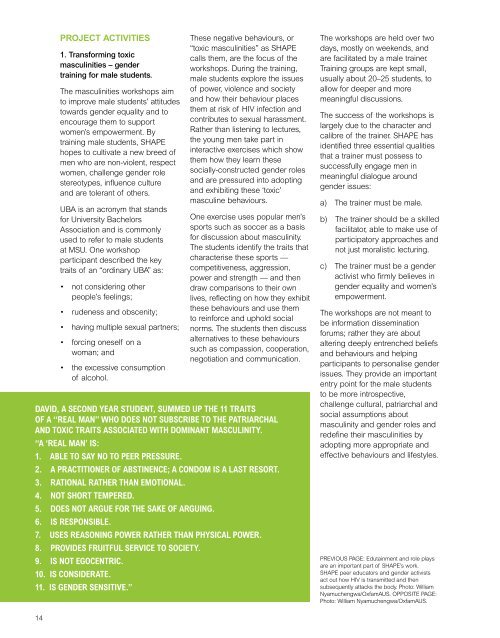
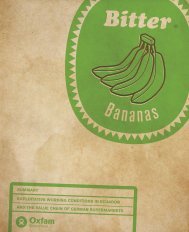
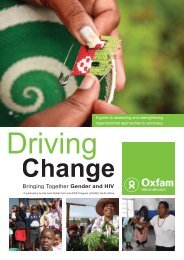
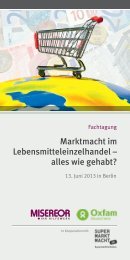
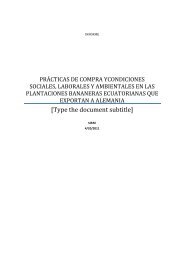
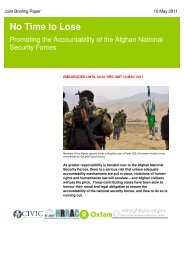
![Download: Faltposter EU-Handelspolitik [PDF 2,17MB] - Germanwatch](https://img.yumpu.com/25095854/1/190x161/download-faltposter-eu-handelspolitik-pdf-217mb-germanwatch.jpg?quality=85)
